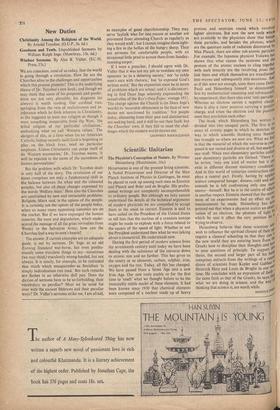New Duties
Christianity Among the Religions of the World.
Press, 15s.)
WE are conscious, most of us today, that the world is going through a revolution. How far are the Churches alive to the challenges and opportunities which this process presents? This is the underlying theme of Dr. Toynbee's new book; and though we may think that some of his proposals and predic- tions are not very plausible, his diagnosis (as always) is worth reading. Our cardinal vice, springing from the vein of exclusiveness and in- tolerance which he finds inherent in Christianity, is (he suggests) to treat our religion as though it were something inseparable from the West, 'the *tribal religion of our particulat civilisation,' embodying what we call 'Western values.' The dangers of this, at a time when (as an-American Catholic bishop recently said) God is beginning to play on the black keys, need no particular emphasis. Unless Christianity can purge itself of its 'Western accessories,' Dr. Toynbee warns, 'it will be rejected in the name of the sacredness of human personalities.'
But the problem with which Dr. Toynbee deals is only half of the story. The revolution of our times comprises not only a fundamental shift in the balance between the white and the coloured peoples, but also all those changes expressed by the words 'Welfare State.' Here also the Churches are confronted by new and intractable problems. Religidn, Mari( said, is the opium of the people. It is certainly not the opium of the people today, when so many more appetising narcotics are on the market. But if we have expunged the human miseries, the want and degradation, which under- scored the message of all the great revivalists from Wesley to the Salvation Army, how can the Churches find a way to men's hearts?
The answer, if current examples are an adequate guide, is not by sermons. Dr. Inge, as an old Evening Standard war-horse, has even posthu- mously some truculent things to say—sometimes (we may think) truculently wrong-headed, but not always. It is timely, for example, to be reminded that much which masquerades as Socialism 'is simply individualism run mad.' But such remarks are flashes in an otherwise dull pan. Does the diction of sermons have to be so forbidding, their vocabulary so peculiar? Must we be sated for ever with the ancient Hebrews and their peculiar ways? Dr. Vidler's sermons strike me, I am afraid, as examples of good churchmanship. They may serve layfolk who for one reason or another are prevented from attending Church as regularly as they would wish'; but I cannot imagine them light- ing a fire in the bellies of the hungry sheep. They are sermons for comfortable people, with an occasional little prod to arouse them from Sunday- morning torpor.
If I were a preacher, I should agree with Dr. Vidler that it was not my job to ventilate my own opinions 'as in a debating society,' nor `to tickle men's ears with rhetoric,' but `to expound God's written word.' But the exposition must be in terms of problems which are actual; and it is disconcert- ing to find Dean Inge solemnly expounding the sexual ethic of the Boy's Own Paper, vintage 1911. The charge against the Church is (in Dean Inge's words) its 'incurable obtuseness in the face of new duties not sanctioned by tradition.' Yet people today, alienating from their past and disinherited, are seeking hard; and it will be not their fault, but the Churches' own, if they fail to meet the chal- lenges which the modern world throws out.
GEOFFREY BARRACLOUGH


































 Previous page
Previous page